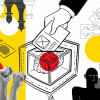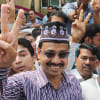How to make dissenters out of citizens

By the time the next election comes, it will be nearly 18 years since a political party not named Awami League was in power. That is almost as long a time as it takes an infant to be eligible to vote, or marry, or obtain a driving license—basically getting the bragging rights of being among adults. But if there were a fair and competitive election come January, and a significant number of people, young or old, voted against Awami League, it would be neither because of their incumbency fatigue nor because of the popularity of the BNP. It would be because of what I call the "accidental art" of making enemies out of ordinary citizens.
Let's illustrate this point through an example. Consider Khadijatul Kubra, the Jagannath University student who was recently released from jail after over 14 months of pre-trial detention. Her crime? She had hosted a webinar on campus politics where a guest made comments critical of the government. At 17 then, still officially minor and unlikely to have developed a strong political opinion like most students her age, she was accused of attempting to "deteriorate law and order" and "defaming" the prime minister. The next chapter of her story would be written in tears. While incarcerated and being denied multiple bail petitions, she allegedly developed kidney issues and was even transferred to a "condemned cell" reserved for death-row convicts, as if she had committed a grave crime. She had only asked a question.
Now she says she is afraid to even post on Facebook—like the 71.5 percent of the youth who, as per a recent survey, feel hesitant to share their thoughts on social media, fearing consequences. Having arrived at voting age and been rudely catapulted into political maturity by undeserved incarceration, imagine who she would vote against if she had the chance. Imagine what that muted but silently seething group of young people—or those who were similarly subjected to or are perturbed by the unending cycle of spurious cases, arbitrary arrests, long pre-trial detentions, custodial torture, enforced disappearances, and other legal or extralegal instances of oppression—would do, if given the chance.
This is how you make enemies out of ordinary citizens.
Before we proceed any further, it's important to distinguish between voting for and voting against. The latter is a protest rooted not so much in political ideology as in disillusionment and a quest for justice and fairness. It's also important to recognise that being anti-AL is not necessarily the same as being pro-BNP. This would be clearer if Bangladesh still had the option for a negative or "No" vote, which was scrapped mere months after the 2008 election. It robbed voters of options that could otherwise increase their participation and partly resolve the low turnout crisis. "Enemies" may seem like a strong word to use to describe how some of them are feeling, but it is one that the political class understands and responds to.
It knew its enemies, real or manufactured, and knew how to exploit them. Against this backdrop, thinking of the more critical citizens in adversarial terms is not a stretch. But while they may still represent a small minority, and therefore little threat to the status quo, the real challenge is predicting what the silent, largely nonpartisan and long-disenfranchised majority would do in the event of a fair election.
Awami League, for example, has always found justification in the Nietzschean theory of cultivating or "inventing" enemies. Long before it kicked off its farcical campaign of choosing its own rivals for the 2024 election, it kept BNP on its toes by bashing it at every opportunity even though the latter hasn't been on the opposition bench for 10 years. It knew its enemies, real or manufactured, and knew how to exploit them. Against this backdrop, thinking of the more critical citizens in adversarial terms is not a stretch. But while they may still represent a small minority, and therefore little threat to the status quo, the real challenge is predicting what the silent, largely nonpartisan and long-disenfranchised majority would do in the event of a fair election.
The rights to question, criticise, debate, publish, or politically organise are fundamental prerequisites for democracy. But in all fairness, denial of these rights, in a less advanced society, does not form a "common cause" strong enough to galvanise or unite the entire population. If we consider Maslow's "hierarchy of needs"—which arranges five tiers of human needs in order of priority—as a baseline, what ordinary citizens really care about in the end is the fulfilment of their basic needs such as food, safety, quality of living, etc. The new age of anger in Bangladesh has more to do with these needs getting harder to satisfy for most people.
Awami League, to its credit, has accomplished a lot over the last 15 years. To its discredit, it has done all it could to undo its effects and besmirch its own name, with the spoils of development mostly grabbed by the better-off. While the beneficiaries of the corrupt political patronage system secured undue concessions and privileges, more and more people desperately flocked to the OMS trucks, thanks to the skyrocketing prices of essentials. While the per capita income kept rising, more people fell into poverty. While billions of dollars were spent to develop flashy transportation networks—bridges, expressways, roads, tunnel/terminal, etc.—thousands died in crashes every year. While politically connected businessmen got away with hundreds of crores of taka in unpaid loans, marginal farmers were harassed even for small loans. While factory owners turned in record profits, workers were killed or laid off for seeking living wages—the list goes on. The story of the last 15 years has really been a story of development negating development.
So when an administration favours specific demographics or interest groups while neglecting others, it is bound to fuel a sense of injustice and exclusion among those left behind. This is how you create resentment cutting across ideological lines, creating foes (read: dissenting voters) where foes didn't exist. The government seems to underestimate just how many people are hanging on by a thread. Through its continued indifference to crimes, corruption, public sufferings or the calls for accountability, it has inadvertently turned many disaffected citizens into de facto adversaries, who can adopt roles akin to party rivals, regardless of their initial political allegiance.
In other words, in a fair contest, the only thing perhaps standing between Awami League and a consecutive three-peat of electoral victories in 2024 is Awami League itself.
Badiuzzaman Bay is assistant editor at The Daily Star.
Views expressed in this article are the author's own.
Follow The Daily Star Opinion on Facebook for the latest opinions, commentaries and analyses by experts and professionals. To contribute your article or letter to The Daily Star Opinion, see our guidelines for submission.

 For all latest news, follow The Daily Star's Google News channel.
For all latest news, follow The Daily Star's Google News channel. 








Comments